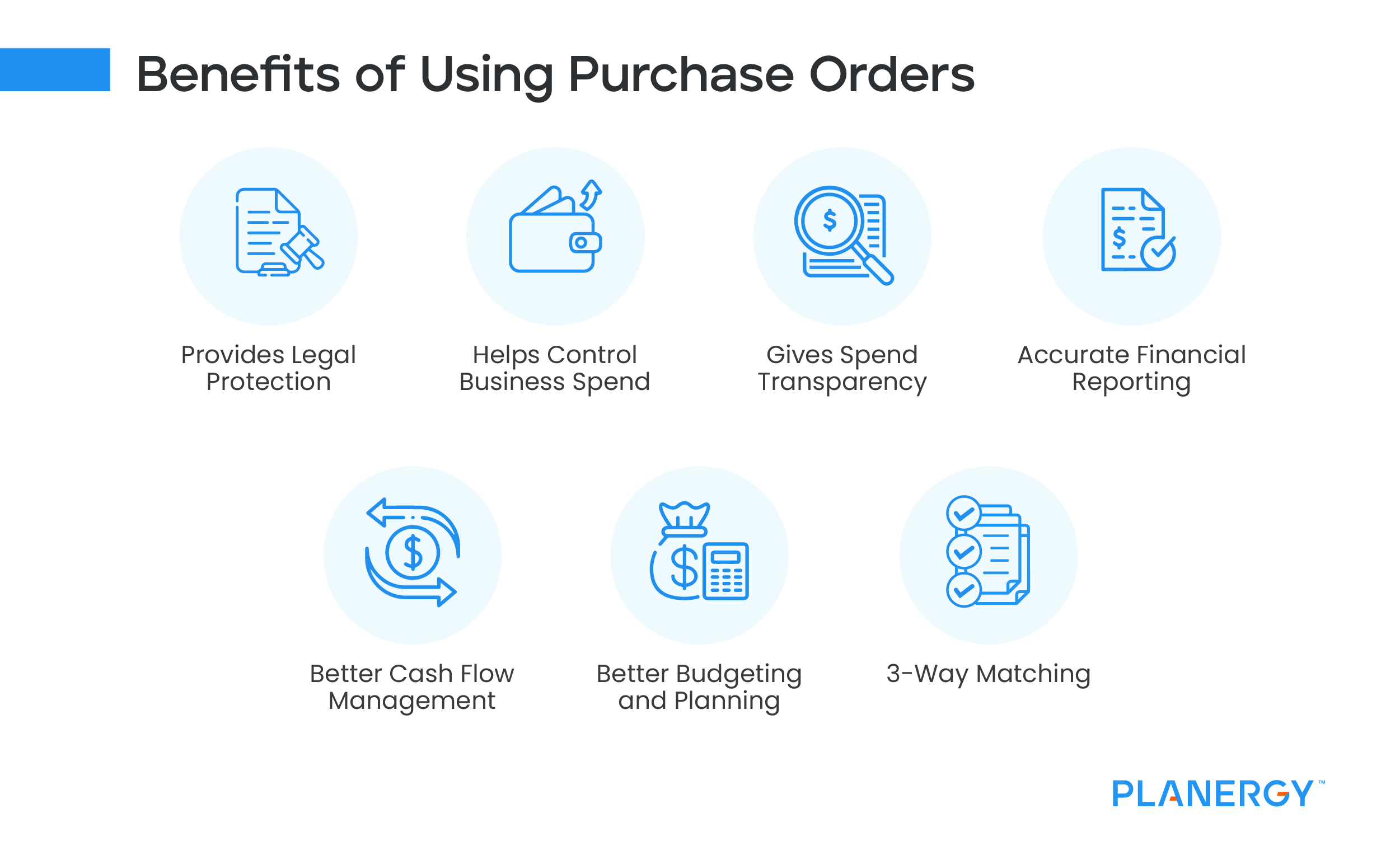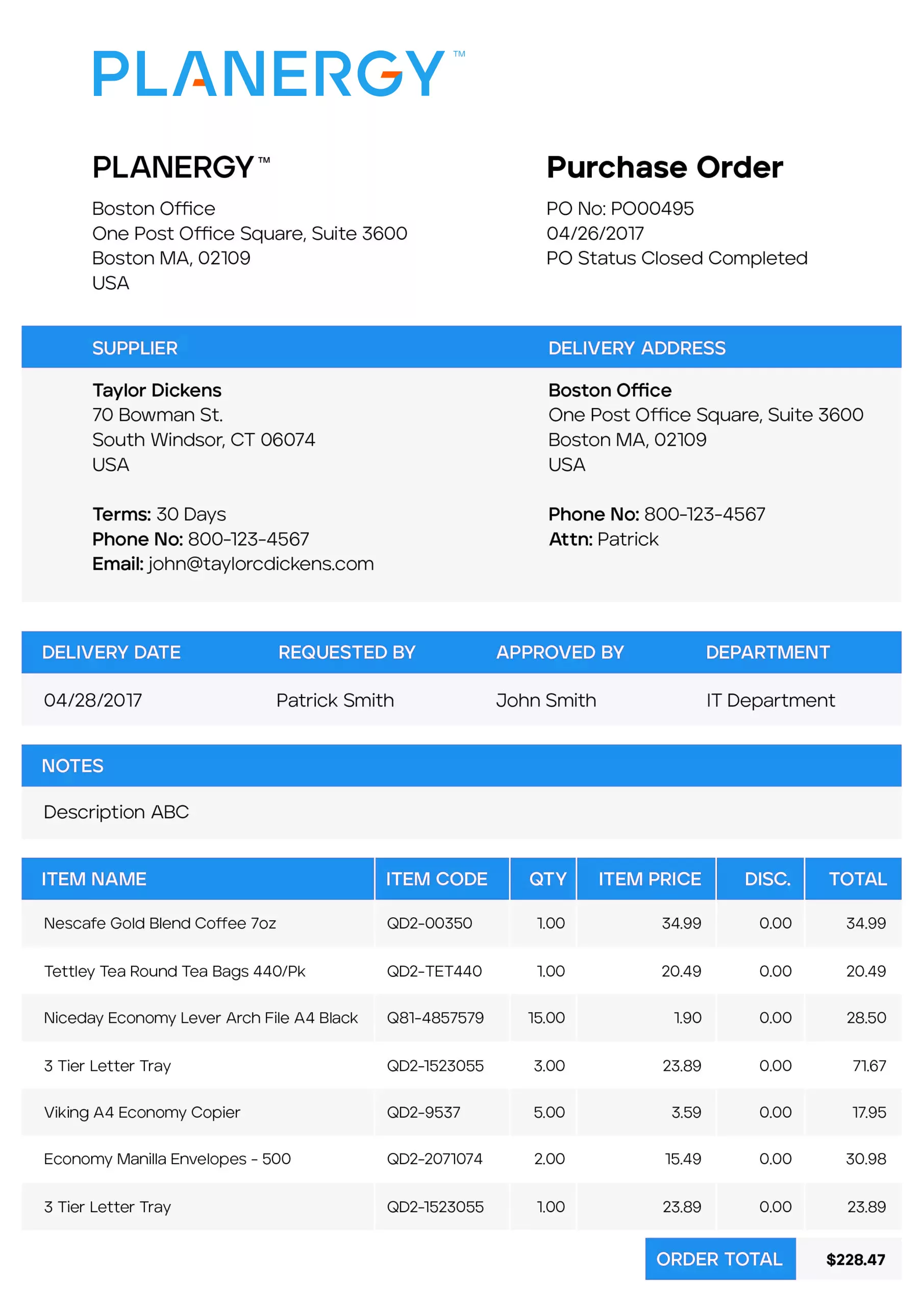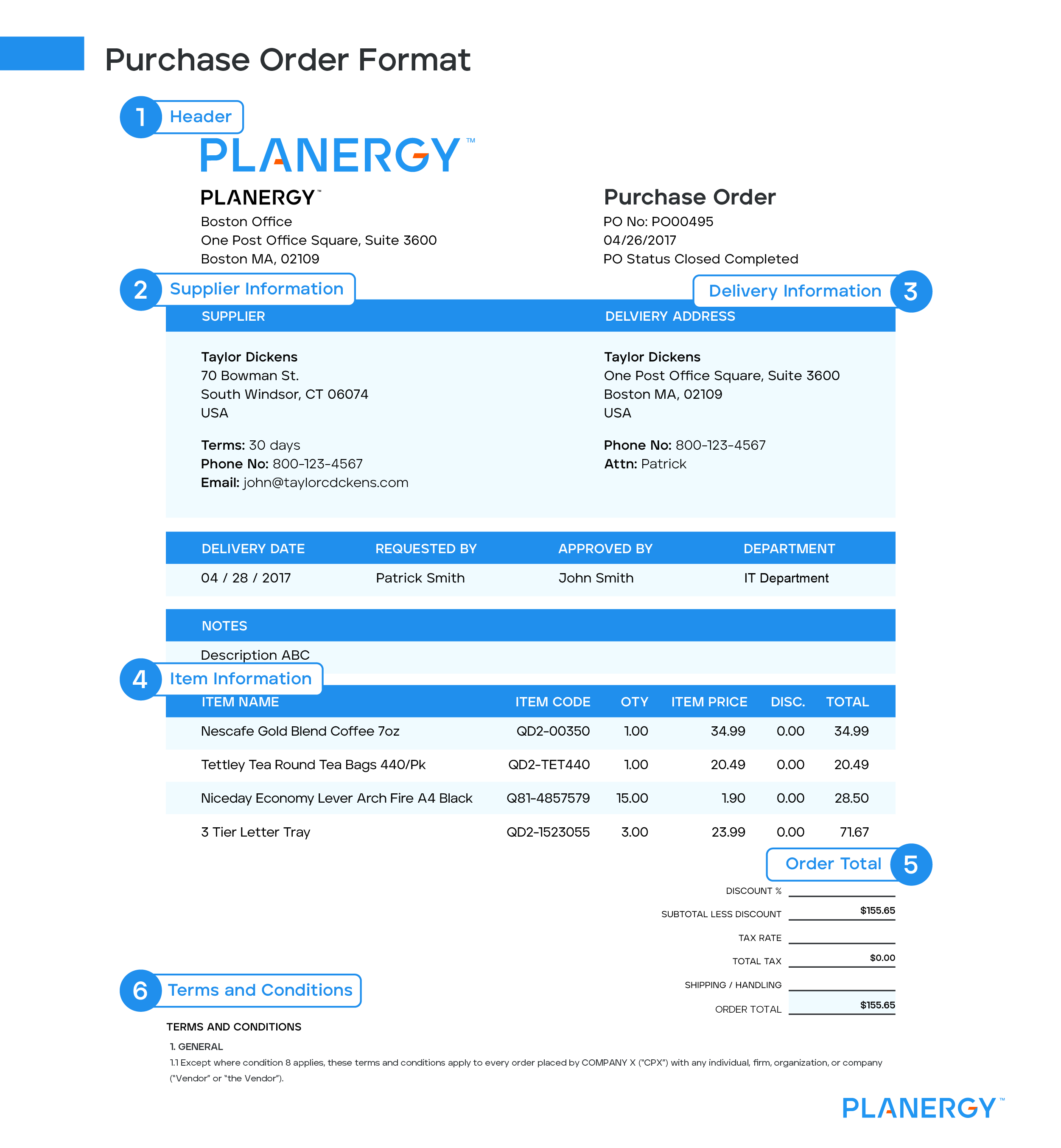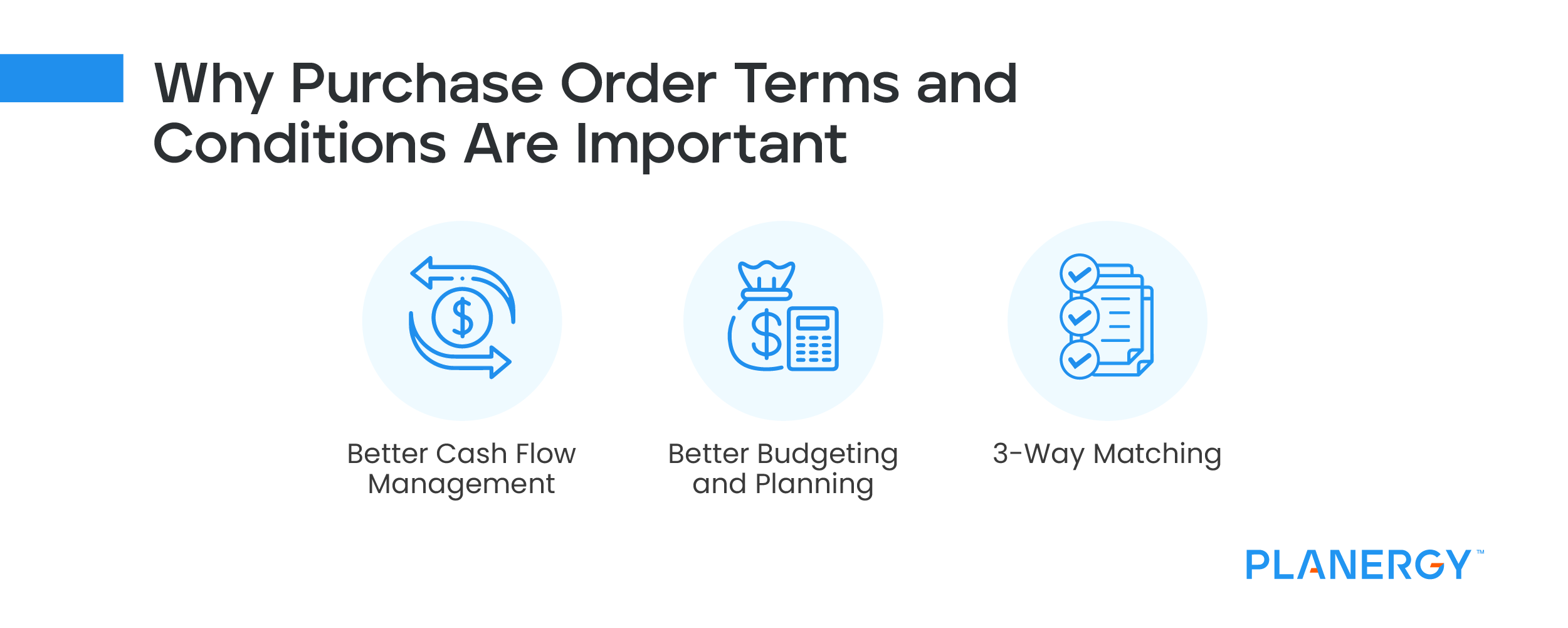Most scroll past them, but terms and conditions protect the rights of everyone involved.
Ensuring the right terms and conditions are part of your purchase orders will not only make it easier to do business and track essential information but ensure you’re protected if and when things go wrong.
Understanding the importance of terms and conditions, and the key components they include means your company can protect itself from exploitation while still obtaining the raw materials, products, and services it needs to do business.
In this article, we’ll discuss purchase orders and their terms and conditions—including examples, best practices, and a word-for-word template you can use as a starting point for your own.
What Are the Benefits of Using Purchase Orders?
To the layman, a purchase order appears to be a simple order form requesting goods and services at a certain price, quantity, and time.
But procurement professionals know about the protections and benefits purchase orders provide.
The benefits of purchase orders include:
Provides Legal Protection
Once they’re accepted and signed by vendors, purchase orders become a legally binding contract . Terms and conditions are an essential component of the purchase order contract because they protect the buyer from malfeasance and provide recourse should something go wrong.
Helps Control Business Spend
By putting in place a purchase order policy you can ensure purchase orders are only placed when they have been correctly approved internally. This can be automated by using purchase order software .
Gives Spend Transparency
By tracking your individual purchases with a purchase order number you can see clearly where you are spending and with who. This empowers you to carry out spend analysis to identify savings opportunities for your company.
Accurate Financial Reporting
Purchase orders give a clear indication of the company’s financial commitments. For month-end and year-end reporting having this information is essential for accruals reporting.
Better Cash Flow Management
Purchase orders allow for better cash flow management by giving the company visibility of committed spend as soon as the cost is committed.
This avoids having surprise invoices coming through unexpectedly so you can be more strategic with payments. Cost of sales figures are available quickly and supplier credit limits can be managed effectively.
Better Budgeting and Planning
Funds must be assigned before issuing a PO you know where your budgets stand and can plan more effectively.
3-Way Matching
When processing invoices in accounts payable you can verify what was agreed at the point of purchase using the PO. Matching against the invoice allows you to identify discrepancies to complete a 2-way match.
If you are accurately tracking delivery of goods or services you have the ability to enforce 3-way matching to ensure goods are received at the right quantity and price.

Terms and conditions are an essential component of the purchase order contract because they protect the buyer from malfeasance and provide recourse should something go wrong.
What Should a Purchase Order Include?
A purchase order needs to include your exact expectations from the supplier. Not just the amount and price, but every factor that matters for your purchase.
Setting clear expectations and having robust terms and conditions ensure that you get the right goods and services when you need them.
A purchase order should include the following:
- Your company name, address, phone number, contact email address, and usually your company logo
- Order date
- Purchase order number
- The supplier’s company name, address, phone number, contact email address, and your specific contact person
- The product(s) or service(s) to be purchased including specifics (brand names, SKUs, model numbers, etc.)
- Quantity per item
- Price per unit
- Delivery date
- Shipping address and shipping contact information
- Billing address
- Any discounts applied to the order per contract terms with the vendor
- Payment terms for when the invoice will be paid
- Terms and conditions (these should be included with every purchase order)

The standard format for a purchase order can vary per company but will usually include a number of sections:
- Header
- Supplier information
- Delivery information
- Item information
- Order total
- Terms and conditions

What Are Purchase Order Terms and Conditions?
Purchase order terms and conditions are the legal contract between your company and the vendors you rely on.
They include things like the cancellation period for the purchase order, detailed expectations on pricing and delivery, and laws that must be complied with.
Purchase order terms and conditions are essential in a new business relationship where trust hasn’t yet been established.
They protect your company’s interests and ensure legal protection in the case of the under-delivery of goods and services.
Additionally, these terms can outline the procedures for handling disputes and specify penalties for non-compliance, providing a clear framework for accountability.
They also serve to protect intellectual property rights and safeguard confidential information shared during the business transaction.
While terms and conditions will legally protect your purchase, good supplier relationships are still important to maintain.
When you have a good relationship, you should be able to resolve a dispute without relying on legal documents. The terms and conditions are used only as a fallback to friendly communication.
When you have a good relationship with your suppliers, you should be able to resolve disputes through friendly communication. Purchase order terms and conditions are used only as a fallback option.
Why Are Purchase Order Terms and Conditions Important?
Purchase order terms and conditions are important because they protect your company in the following ways:
Create a Clear Legal Framework
Purchase order terms and conditions that have been drawn up and reviewed by lawyers establish a consistent framework for every transaction you conduct.
Instead of operating in a gray area, you can be sure that every transaction is protected under the same legal framework that protects your interests in all possible circumstances.
Reduce the Possibility of Litigation
Terms and conditions make the expectations and obligations of all parties clear. The more detail and specificity involved, the less appealing it will be for anyone to claim ignorance—and the less likely it will be they can claim a violation and take the matter to court.
Enforce Compliance and Limit Liability
Compliance can be written into your terms and conditions if your company is subject to labor, eCommerce, or other laws and regulations. This reduces your risk by ensuring your supplier is legally responsible for compliance—and makes that expectation clear.

What Should Purchase Order Terms and Conditions Include?
Purchase order terms and conditions should include every detail about the purchase order’s expectations, obligations, penalties, and incentives.
They should be as clear as possible so they can’t be misunderstood. Terms and conditions vary depending on need, and shouldn’t be exactly the same as your competitors.
Most of what your purchase order terms and conditions include fit under the following categories:
- What you’re agreeing to in terms of purchase price, quantity, and reasonable time for delivery
- What happens in the event of failure to deliver
- The cancellation period for the purchase order
- What the expected quality should be
- A broader definition of payment terms (beyond Net 30)
- Indemnification clauses should the vendor breach the contract
- Confidentiality agreements/proprietary information
- Contract termination agreements
- Information on warranties and buyer’s rights
- Applicable federal and local laws and ordinances to comply with
- General liability and certificate of insurance requirements and/or exemptions
- Workers’ compensation requirements
- Requirements of working with independent contractors and subcontractors
- Responsibility for attorney’s fees or other fees should they get involved
Terms and conditions are detailed and exhaustive, and certainly, there are more than what’s provided in this list.
That’s why we’ve provided a sample of terms and conditions that you can use as a starting point below.
Once they’ve been formalized, your purchase order terms and conditions can be automatically included for every purchase order sent from your procure-to-pay software.
This tool ensures all general terms and conditions protecting intellectual property rights, trade secrets, and other proprietary information are included by default.
Your terms and conditions may not be the same as those of your competition, or even most companies in your market—what matters is aiming for maximum detail and specificity when laying out expectations, obligations, penalties, and incentives.
Sample Purchase Order Terms and Conditions
The first step in drafting terms and conditions of your own is to work with your legal team to identify the details you want to formalize and include in every transaction.
The second is identifying the key parts of an effective set of terms and conditions, and writing each section to fulfill their respective purposes.
Your terms and conditions may not be the same as those of your competition, or even most companies in your market—what matters is aiming for maximum detail and specificity when laying out expectations, obligations, penalties, and incentives.
Let’s look at a set of sample terms and conditions for Company X, located in London.
NOTE: All examples presented are for discussion purposes only, and should not be used or modified except under the guidance of your legal professionals.
PLANERGY does not provide legal advice or legal documentation.
When composing, modifying, or approving any contract or other legally binding document, we strongly advise you to seek independent legal advice.
GENERAL
1.1 Except where condition 8 applies, these terms and conditions apply to every order placed by COMPANY X (“CPX”) with any individual, firm, organization, or company (“Vendor” or “the Vendor”).
Any terms and conditions contained within or attached to any document of any kind which are inconsistent with the terms and conditions outlined in this document, or which attempt to add to or modify these terms and conditions in any way shall not be deemed acceptable or legally binding unless expressly and clearly accepted by CPX in writing.
Should the Vendor be unable to supply such written agreement, the Vendor agrees to waive or withdraw the supplemental or modifying terms and conditions and contract with CPX exclusively on the basis of these terms and conditions.
Acceptance of goods and/or services by CPX shall not constitute or be deemed to constitute acceptance of Vendor-supplied or otherwise non-standard terms and conditions by CPX.
All parties affirm that the contract shall commence and the Vendor will be bound contractually to fulfill the obligations outlined within these terms and conditions upon the issuance of a purchase order (“the contract”) to the Vendor by CPX.
PURCHASE ORDER
2.1 The Vendor agrees to ensure the goods and/or services provided shall:
- correspond with the quantity, type, sort, quality, and description defined in the purchase order;
- meet performance standards, benchmarks, and delivery schedule specified on the purchase order or as specified to the Vendor by CPX;
- be of satisfactory quality (as defined by the Sale of Goods Act 1979) and fit for any purpose specified by the Vendor or specified to the Vendor by CPX;
- where applicable, be free from defects in design, materials and workmanship and remain so for a period of 12 (twelve) months from the delivery date;
- comply with all applicable statutory, legal, and regulatory requirements relevant to the manufacturing, production, labeling, packaging, storage, handling, and delivery of the specified goods.
2.2 Should the goods and/or services provided fail to comply with the CPX purchase order and/or submitted instructions, CPX may, at its option, either return the goods to the Vendor at the Vendor’s own expense and risk of loss; reject the goods and/or services at the seller’s risk; require the Vendor to replace the goods or re-perform the services; accept in whole or part such goods and/or services supplied by the Vendor without prejudice to or limitation of any rights held by CPX to claim damages or other compensation for loss, damage, or material failure suffered as a result of the Vendor’s failure to comply with these terms and conditions.
2.3 In the event the seller fails to deliver the goods, or perform the services, specified by the date specified in the purchase order, CPX may, at its option, terminate the contract without notice.
PRICING, PAYMENTS, AND OFFSET
3.1 Prices paid for goods and/or services shall be the prices established in the purchase order, including, but not limited to, packaging costs, insurance fees, and shipment of goods (and/or provision of services). No extra charges, if any, will be incurred unless agreed upon in writing by CPX.
3.2 With regard to goods, the Vendor agrees to invoice CPX upon delivery or at any time after delivery of the goods. Regarding services, the Vendor agrees to invoice CPX in full, monthly, or quarterly as specified in the purchase order.
VAT invoices must contain the purchase order number and include complete supporting information required by CPX in order to be considered valid.
3.3 CPX will pay all invoiced amounts to the bank account specified in writing by the Vendor within 30 days of receiving a valid and correct invoice.
3.4 CPX may, without limiting its other rights or remedies, offset (i.e., set off) any amount owed to it by the Vendor against any amount owed by CPX to the Vendor.
INSURANCE AND INDEMNITY
The Vendor agrees to hold harmless and indemnify CPX in full against all costs, expenses, damages, and losses (incurred directly or indirectly).
This includes any interest, fines, legal and other professional fees, and expenses awarded against, incurred by, or paid by CPX arising from contract performance or any breach of these terms and conditions by the Vendor, as well as any term or obligation implied by law or any statutory provision that may be in force from time to time.
The Vendor agrees to maintain at all times all required insurance coverage and provide written evidence of such coverage to CPX upon request.
CONTRACT CONFIDENTIALITY
The Vendor agrees to treat all confidential information belonging to CPX as confidential subject matter and protect it accordingly. The Vendor agrees not to disclose any such information without the prior written consent of CPX.
CONTRACT TERMINATION
In addition to clauses 2.3 and 7.1, if at any time after the contract commences the Vendor:
- Commits a material or persistent breach of contract and (provided said breach may be remedied) fails to make good faith remedy of said breach within 7 (seven) days after receiving notice of the breach;
- Commits a material breach which cannot be rectified;
CPX may opt to terminate the contract with immediate effect.
GENERAL
7.1 Force majeure: Neither party shall be liable to the other due to any delay or failure to perform its obligations under the Contract if and to the extent that such delay or failure is caused by circumstances beyond the reasonable control of that party which, by their nature, could not have been foreseen by such a party or was unavoidable if foreseeable.
Should such circumstances prevent the Vendor from supplying the specified goods and/or services for more than 4 (four) weeks, CPX may, without limiting its other rights or remedies, may provide written notice to the Vendor to terminate this contract with immediate effect.
7.2 Assignment and subcontracting: The Vendor agrees not to assign, transfer, subcontract or deal in any other manner with all or any of its rights and obligations under the contract without prior written consent from CPX.
7.3 Notices: Any communication required to be given under or in connection with this contract shall be in writing and delivered to the other party via prepaid, first-class post.
7.4 Waiver: No delay, neglect, or forbearance on the part of either party in enforcing against the other party any of the terms or conditions specified by the contract will be, or deemed to be, a waiver or prejudice in any way against any right of that party under this contract.
7.5 No partnership: No partnership of any kind between any parties is intended by, or constituted through, this agreement.
7.6 Contracts (Rights of Third Parties) Act 1999: Persons not a party to this agreement shall have no rights under or in connection with it.
7.7 Variation: Any variation, including any additional terms and conditions, to the contract will only be binding and enforceable when agreed to in writing and signed by CPX.
7.8 Severance: Should any provision of this contract, in whole or in part, be held to any extent to be unlawful or unenforceable under any enactment or rule of law, the remaining provisions shall stand in full force and effect.
7.9 Statutory Requirements: The Supplier shall comply with all statutes, orders, regulations, or bylaws related to the execution and fulfillment of this contract, and agrees to indemnify CPX against all losses, claims or liabilities, expenses, proceedings or otherwise resulting from the Vendor’s noncompliance with the same.
7.10 Governing law and jurisdiction: The entire agreement shall be governed by, and construed in accordance with, English law, and the parties irrevocably submit to the exclusive jurisdiction of the courts of England and Wales.
TERMS AND CONDITIONS
These terms and conditions will apply unless CPX specifies different terms and conditions in its tender or quotation documentation, or via other contracts entered into by the parties.
Should CPX specify such changes and apply different terms and conditions in writing, those terms and conditions will override the purchase order terms and conditions and will apply instead of these.
Don’t Settle for Boilerplate Terms and Conditions.
Sure, they might take a few cups of coffee and the occasional glance at the legal dictionary to get through, but terms and conditions for purchase orders make up in risk reduction and legal protection what they lack in glitz and glamour.
Make sure yours are thorough, legally vetted, and crystal clear. Then you can rest easy knowing every purchase order is a powerful and productive part of your company’s success.




